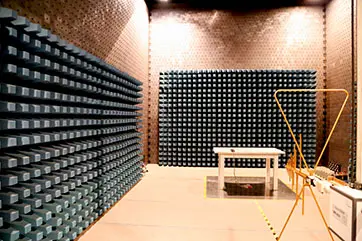
What is Japan Radio Certification?
Many domestic manufacturers and exporters are unfamiliar with Japanese standards, often leading to product returns due to non-compliance. E-commerce sellers may also face product delisting by platforms. Today, we will explore telec certification for Japan's consumer wireless electronic products.

Introduction to TELEC Certification
TELEC certification, also known as Mic certification or giteki certification (as referred to by Amazon), is the primary conformity certification for radio equipment in Japan. TELEC (Telecom Engineering Center) is a major registered certification body, while MIC (Ministry of Internal Affairs and Communications) is the government agency responsible for regulating radio frequency equipment. MIC formulates regulations, whereas TELEC is one of the designated certification bodies under MIC. Therefore, TELEC certification is also referred to as mic certification.
TELEC certification is mandatory, and the certification bodies are MIC-approved registered organizations that assess compliance within designated radio equipment categories.
Purpose and Scope of TELEC Certification
TELEC certification is Japan's mandatory approval for wireless products, similar to China's srrc certification. It applies to all products with wireless transmission functions, including:
- Bluetooth
- Wi-Fi
- 3G/4G
- Wireless speakers and headphones
- Wireless chargers
- Routers
- Remote-controlled toys
These products must comply with Japan's Radio Law and undergo testing based on MIC Notice No.88 standards issued by the Japanese Ministry of Internal Affairs and Communications.
TELEC Certification Requirements
- No local representative is required
- No local testing is needed
- Certification costs vary depending on product communication frequency bands and modules
- Fees are determined by specific frequency bands and channels
Products Requiring TELEC Certification
- 3G/4G products
- Wi-Fi devices
- Wi-Fi 2.4G & 2.5G bands
- Bluetooth devices
- 2.4GHz, 10GHz, 315GHz, 902-928GHz bands
- 2G/3G/4G products
Note:
- 433MHz and 868MHz products do NOT require GITEKI certification
- 2.9GHz and 5.8GHz are not open for civilian use under GITEKI certification
TELEC Testing Items
1. Frequency Error Measurement
2. Occupied Bandwidth and Spread-Spectrum Bandwidth/Factor
3. Unwanted Emission Intensity Measurement
4. Antenna Power Error Measurement
5. Limitation of Collateral Emission of Receiver Measurement
6. Transmission Antenna Gain (EIRP Antenna Power) Measurement
7. Transmission Radiation Angle Width (3dB Beamwidth) Measurement
8. Duty Cycle Measurement
9. Retention Time Measurement
TELEC Certification Process
1. Submit Application Form
2. Provide Required Documents (Product manual, schematics, etc.)
3. Prepare and Submit Samples (2-3 units)
4. Conduct Sample Testing
5. Submit Test Results to MIC for Approval
6. MIC Issues Certification
Certification Timeframe: 3-4 weeks
TELEC Certification Logo and Required Documents
Required Documents:
1. System Block Diagram
2. System Schematic Diagram
3. User Manual
4. Operational Description
5. BOM List
6. PCB Layout (including component reference numbers)
7. Wireless Module Documentation (schematics, layout, or existing MIC certificate)
8. ISO 9001 Certificate (Valid within its expiry date)
9. Label Design and Placement Diagram
10. Antenna Specifications (Including name, dimensions, and manufacturer details)
Importance of TELEC Certification for Export
A. Market Access: TELEC certification is a legal requirement to enter the Japanese telecommunications market. Non-certified products cannot be legally sold or used in Japan.
B. Product Quality Assurance: Certification demonstrates high standards of quality and performance, increasing product competitiveness.
C. Regulatory Compliance: Ensures compliance with Japanese laws and standards, preventing legal issues or fines due to non-compliance.
D. Consumer Trust: TELEC-certified products enhance customer confidence, as certification proves safety and reliability.
About the Testing Laboratory
JJR Testing (China) is an internationally recognized laboratory accredited by ISO/IEC 17025 (USA), CNAS (China), and CPSC (USA). It is an fcc id-certified testing laboratory and holds WPC Qi 2.0 authorization. JJR Testing is also accredited for certifications in:
- Korea (KCC)
- European Union (CE/CENB)
- Canada (IC)
- Taiwan (NCC, bsmi)
- Australia (RCM, SAA)
- Japan (MIC)
JJR Testing operates laboratories in Shenzhen and Dongguan, providing global testing and certification services, including ROHS Testing for international markets.
As a professional third-party testing and certification body, JJR Testing also offers restricted substance testing for:
- REACH
- POPs
- California Proposition 65
- TSCA
- FCM (Food Contact Materials)
These services help companies manage risks across raw materials, production processes, and final products, ensuring compliance with target market requirements.
Contact Us for TELEC Certification
If you have any questions regarding TELEC certification costs, timelines, or required documents, feel free to contact us via the following channels.
Email:hello@jjrlab.com
Write your message here and send it to us
 2026 EU SVHC Candidate List (253 Substances)
2026 EU SVHC Candidate List (253 Substances)
 LFGB Certification Cost and Timeline Guide
LFGB Certification Cost and Timeline Guide
 Bluetooth FCC Test Report
Bluetooth FCC Test Report
 Is FCC Testing Required?
Is FCC Testing Required?
 Where to Find FCC Test Reports
Where to Find FCC Test Reports
 LFGB Compliance Testing for Plastic Food Contact M
LFGB Compliance Testing for Plastic Food Contact M
 How to get LFGB Compliance Report for Food Grade P
How to get LFGB Compliance Report for Food Grade P
 LFGB Certification Process for Kitchenware Product
LFGB Certification Process for Kitchenware Product
Leave us a message
24-hour online customer service at any time to respond, so that you worry!




